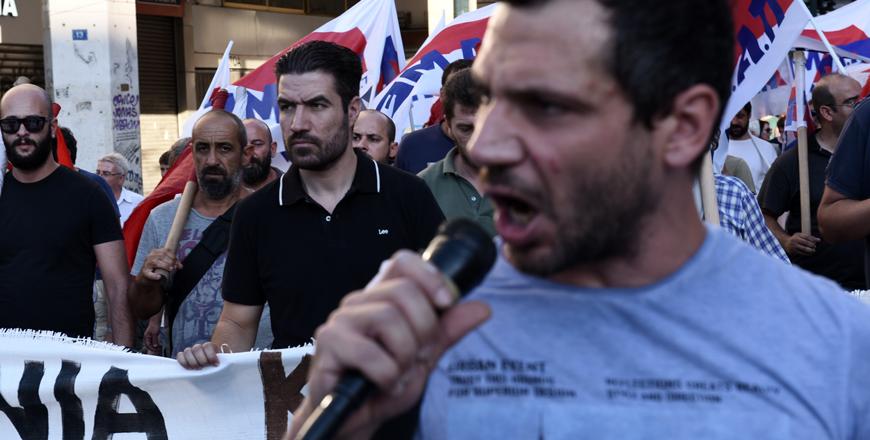You are here
New blow for Greece’s Syriza as rebels try to form gov’t
By AFP - Aug 24,2015 - Last updated at Aug 24,2015

A Syrian woman cries while holding her children moments after arriving on a dinghy on the island of Lesbos, Greece, on Sunday. Greece, mired in its worst economic crisis in generations, has been found largely unprepared for a mass influx of refugees, mainly Syrians. Arrivals have exceeded 160,000 this year, three times as high as in 2014 (Reuters photo)
ATHENS — Greece's embattled ruling Syriza Party suffered another blow Monday when its secretary quit, as eurosceptic rebels were given a mandate to try to form a government.
Syriza secretary Tasos Koronakis stepped down in protest at Prime Minister Alexis Tsipras' decision last week to call early elections, backtracking on an earlier proposal to hold a party congress in September to address the rebel faction.
Greece is likely headed for snap elections as early as next month after Tsipras resigned in the face of the internal Syriza revolt over his acceptance of the tough terms of a massive new international bailout deal.
Tsipras on Monday told his party's remaining political secretariat that he did not want a "leftist civil war" to break out during the election campaign.
According to a government note, the outgoing PM said his aim remained to "gradually" take the country out of austerity, and ruled out cooperating with the conservatives and socialists after the election.
With the Athens stock exchange shedding over 10.5 per cent as global shares plunged over China economic worries, the ex-Syriza rebels on Monday formally received a mandate from President Prokopis Pavlopoulos to attempt to form a government in the next three days.
'A waste of time'
The leftist hardliners, who call themselves the Popular Unity Party after the victorious 1970 Chilean alliance of Salvador Allende, are the third and last party to receive a mandate under the terms of the constitution.
"We will use this mandate to demonstrate the necessity of an anti-austerity government," said party leader Panagiotis Lafazanis, a former senior Communist who has argued that Greece can happily exist without the euro.
The main opposition New Democracy conservatives — who have 76 seats in the 300-member parliament — had earlier attempted and failed to form a government.
With just 25 lawmakers, Popular Unity cannot realistically muster enough support for a majority in the 300-seat parliament either.
Pavlopoulos is expected to terminate the procedure on Thursday and name a caretaker administration under the head of the supreme court.
Tsipras' coalition ally Panos Kammenos, head of the nationalist Independent Greeks Party, on Monday branded the process "a waste of time".
Tsipras resigned on August 20 after an anti-bailout mutiny by Syriza eurosceptics formally wiped out his parliamentary majority, leaving the party with around 124 seats.
The EU has taken the snap ballot decision in its stride, and debt rating agency Moody's on Monday even called Tsipras' resignation "credit positive", arguing that it could well create a more cohesive government.
But French Foreign Minister Laurent Fabius told AFP that whichever government emerges, "has to respect the agreement contracted with Europe".
Tsipras famously tried to tear up previous austerity accords upon coming to power in January, eventually backing down in July after the European Central Bank restricted funding to Greek banks and forced Athens to impose capital controls.
War of words
Government spokeswoman Olga Gerovasili said on Sunday that elections — Greece's sixth in six years would probably be held in September, just eight months after Syriza took office in January.
"As things stand, it is feasible to hold elections on September 20," she told state TV ERT.
An unprecedented war of words has broken out between Greece's outgoing government, the parliament chief and the president over the snap ballot.
The government has accused parliamentary speaker Zoe Constantopoulou of "behaving like a dictator" after she branded the early election procedure "undemocratic and unconstitutional".
Tsipras is seeking to defend the tough terms he accepted in the 86-billion-euro ($96 billion) rescue package, the third for Greece in five years.
Constantopoulou, Greece's youngest parliament speaker at 38, has accused the 65-year-old president of breaking the rules by skipping a parliamentary technicality in order to hasten the procedure.
The president — an esteemed professor of constitutional law — responded on Saturday by dismissing her arguments as "legally baseless".
Constantopoulou, whose father was a former head of Syriza's precursor party Synaspismos, vehemently opposed the third EU bailout Tsipras signed in July and repeatedly sought to frustrate its ratification in parliament through stalling tactics.
A former rising star of Syriza, Constantopoulou is now rumoured to be considering joining the anti-bailout Popular Unity.
Another prominent Syriza lawmaker, flamboyant ex-finance minister Yanis Varoufakis, on Sunday said he would not be a candidate with Tsipras' party in the election.
"Syriza is adopting an irrational doctrine that I have opposed for five years: to further extend the crisis and pretend it is solved, while maintaining a debt that cannot be paid," he told France's Journal du Dimanche.
Related Articles
ATHENS — Greek opposition politicians embarked on the laborious and apparently futile exercise on Saturday of trying to form a new governmen
ATHENS – Greece's parliament on Thursday passed legislation on a second batch of reforms needed to help unlock a huge international bailout
ATHENS — Greece's government on Tuesday submitted tough bailout terms demanded by eurozone creditors to parliament, as Prime Minister Alexis

















